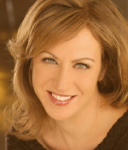Rabbi Zoe Klein

“Sometimes younger kids have great wisdom in how to comfort.
You don’t want to deny them the opportunity to comfort.”
How do I start this conversation with my kids?
The most important thing is to start it early. Kids know when things are off, and your relationship with your kids is based on being open and honest. But you also don’t have to say everything all at once. You need to say something. Maybe in the beginning it would be good to start with, “I had a doctor’s appointment and I am very sick inside, and over the next few day and weeks you might notice that I am very sad. That is because I am thinking about you and what the doctor told me. I am working a lot of stuff out and I haven’t figured out how to put it in words yet, but when I do, we will talk about it some more.” Because if you are acting differently, they will sense it.
But I don’t want to scare them too much. Is there a way to say it that not so scary?
Well, at the same time part of your work will be surrounding them with other caring adults. Some people reach out to clergy, but not everyone. Make it clear that there are relatives, counselors, friends, therapists, other people who care about them. So they may feel scared, but not alone. Make it very clear who the caring adults around your family are. Not everyone is part of a faith community. But many are. I can say that if your family is active in a synagogue, the moment you let someone know what your situation is, the community will spring into action around you.
“It’s okay to let your children know what your state of mind is.”
We’ve never been a very religious family. Should I get in touch with a priest or rabbi anyway?
It depends. It’s really up to you to decide what feels comfortable theologically. If you’re sort of on the fence, a lot of times it is a good idea to sit with clergy and ask some of those questions. There are some simple, elegant “answers” people have. For me, I’ve always understood death as a coming home. Death is where I was before I was born. That seems very peaceful to me. Others will say it is a night between two days. So for some of us there are these kind of shorthand ways of talking about death. But certainly not everyone. So it is okay to ask some questions yourself, sit with a trusted counselor or clergy and figure out some ideas that you can offer your children.
My kids are very focused on WHY this is happening. How can I help them live with that?
That “Why?” invites a lot of questions. How do you forgive the world for this? How do we not let our anger eclipse our blessings? And, how do we deal with the fact, the real fact, that some of these questions are unanswerable. The WHY is very valid, but it can be exhausting if your questioning gets stuck there. The answer is: we live in a haphazard world, a broken world, where things happen for, really, no reason. But within that world we chose to love each other, to write poetry, to watch sunsets. We don’t just wallow in our misery. So you can validate that questioning, that WHY?, but there is so much embedded in that question that you can talk about.
I am dying, but I am still busy being the mom. That means I need to know how my kids are doing. How often should I ask them about how they are doing?
What’s important is to check in with them. Even a quick check in. And not specifically about your illness. It could be about their math test. Because of course they have all of that going on. So it can be a general check in, but a check in.
Should I talk to my kids about my funeral?
I think it’s a good idea. They will know what you would like to include, what kind of legacy matters to you. I know some people are afraid to talk about the funeral, they think it is bad luck, but I think if you can, you should. It also helps kids know what to expect, and you may feel much lighter and more in control if you can talk it through with them.
Zoe Klein says the part of her job as a rabbi that she enjoys most is officiating at funerals. “Weddings are a fantasy day. Who knows how things will turn out? But at a funeral, everyone’s heart is much more open.” Rabbi Klein is the mother of three children under the age of ten, and a published novelist. She is the spiritual leader of Temple Isaiah of Los Angeles.